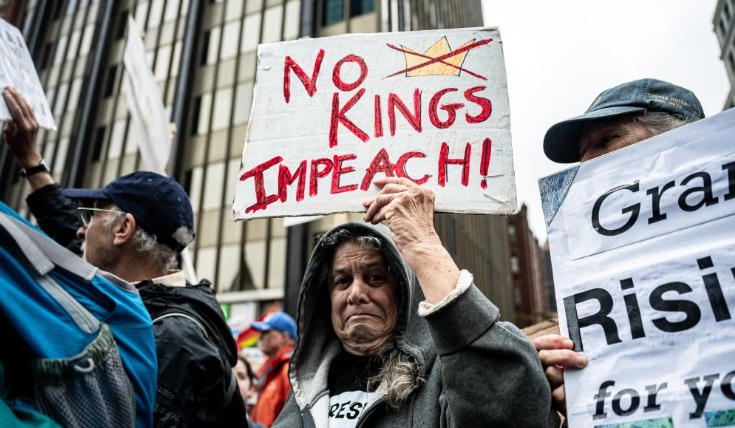Seventy-two senators voted to set the resolution aside, versus 11 who backed it, easily clearing the simple majority needed to kill the resolution in the 100-member chamber….reports Asian Lite News
Dozens of President Joe Biden’s fellow Democrats signed a letter on Friday urging his administration to reaffirm that the US strongly opposes “the forced and permanent displacement” of Palestinians from Gaza.
The letter to Secretary of State Antony Blinken, led by US Representatives Ayanna Pressley and Jamie Raskin, was signed by 60 Democratic House of Representatives members, reflecting concern, especially on the left, over the steep toll on Palestinian civilians of Israel’s campaign against Hamas.
“We urge you to continue to reiterate the United States’ firm commitment to this position and ask that you provide clarification regarding certain provisions of the administration’s supplemental humanitarian and security funding request,” the letter said.
A State Department spokesperson said the department does not typically comment on congressional correspondence. But on the broader issue of displacement, the spokesperson said in an email, “We have been clear. There must be no enduring forced displacement of Palestinians, whether inside of Gaza or outside.”
The spokesperson said State had rejected statements by some Israeli officials calling for resettlement of Palestinians outside of Gaza and understands from Prime Minister Benjamin Netanyahu that is not the Israeli government’s policy.
The US gives Israel $3.8 billion in annual military assistance. Biden has asked Congress to approve an additional $14 billion, part of a sweeping supplemental funding request stalled in Congress as Republicans and Democrats negotiate immigration policy changes.
Separately, a group of Democratic senators said on Friday that 18 Democrats in that chamber support an amendment that would require that any country receiving funding in the supplemental use the money in accordance with US law, international humanitarian law and the law of armed conflict.
Also this week, Senator Bernie Sanders, an independent who caucuses with Democrats, forced a vote on a resolution that would have frozen security aid to Israel unless the State Department produced a report within 30 days examining whether Israel committed human rights violations in its campaign against Hamas.
Seventy-two senators voted to set the resolution aside, versus 11 who backed it, easily clearing the simple majority needed to kill the resolution in the 100-member chamber.
Israel launched the war to eradicate Hamas, an Iran-backed group sworn to Israel’s destruction, after militants stormed across the border on Oct. 7, killing 1,200 people and capturing 240 hostages, Israeli tallies showed.
Gaza health authorities said the war, now in its fourth month, has killed more than 24,760 people in the Palestinian enclave.
Biden signs stopgap measure to extend govt funding
President Joe Biden has signed a stopgap funding bill that will keep the government open into early March, avoiding a partial shutdown that would have taken effect on Saturday.
The bill, which was approved by Congress on Thursday, buys lawmakers more time to finish the formal appropriations process for fiscal year 2024, which began on October 1, 2023, reports Xinhua news agency.
The stopgap bill cleared the Senate by a tally of 77 to 18.
The House passed the measure by a vote of 314-108 amid opposition from hard-line House Republicans, who had attempted to cut federal spending and add border security provisions in the “clean” stopgap measure.
Senate Majority Leader Chuck Schumer said Democrats are not willing to pass a border security bill before passing funding for Ukraine. “We have to do both together,” he said.
Some conservative Republicans, however, do not want to provide further aid for the war-torn country. Texas Congressman Keith Self said his constituents have made it clear that “our own border must be secured first before even talking about further funding to Ukraine”.
This is the third stopgap funding measure this Congress has approved, with the first in September 2023 and the second in November.
Former House Speaker Kevin McCarthy, a Republican, was unprecedentedly ousted from his post by conservative members of his own party after passing a “clean” short-term spending bill with the support of Democrats.
In November, McCarthy’s successor, House Speaker Mike Johnson worked with Democrats to approve another stopgap spending bill that extended funding for some federal agencies and programs until January 19, 2024, and others through February 2.
Earlier this month, House and Senate leaders reached an agreement on a short-term spending deal that would move upcoming government funding deadlines to March 1 and 8, respectively, buying legislators more time to craft longer-term spending bills.
Passage of the stopgap bill marks a cleared hurdle for Johnson, who cut a deal with Democratic leaders to avert a government shutdown and faced backlash from hard-right House Republicans, who had lashed out at the bill for a lack of spending cuts and border security policy.
Just as McCarthy, Johnson had to rely heavily on Democratic support on the passage of the stopgap bill, with a fast-track process that requires two-thirds of the votes from House members.
Some Republican lawmakers even expressed regret for casting vote for Johnson’s speakership, indicating continued division between moderates and conservatives within the Republican Party.
Maya MacGuineas, president of the Committee for Responsible Federal Budget, recently said in a statement that the stopgap spending bill will hopefully allow Congress to pass appropriations bills in the next few weeks before the continuing resolution runs out.
“Congress should now work to pass individual appropriations bills rather than a gigantic omnibus, which can often be accompanied by a slew of other debt-increasing provisions attached to it,” said MacGuineas.













